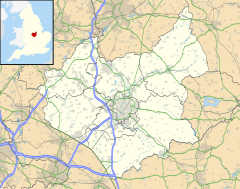| Carlton | |
|---|---|
 St Andrew's Church, Carlton | |
Location within Leicestershire | |
| Population | 305 (2011 Census) |
| OS grid reference | SK394051 |
| Civil parish |
|
| District | |
| Shire county | |
| Region | |
| Country | England |
| Sovereign state | United Kingdom |
| Post town | NUNEATON |
| Postcode district | CV13 |
| Dialling code | 01455 |
| Police | Leicestershire |
| Fire | Leicestershire |
| Ambulance | East Midlands |
| UK Parliament | |


Carlton is a small rural parish located east of the River Sence in Leicestershire, England, around 2.2 miles north of Market Bosworth. According to the 2011 census, Carlton has a population of 305 [1] However, from 2014 it is estimated that there are around 330 people living there with a total of 283 registered electors. [2]
